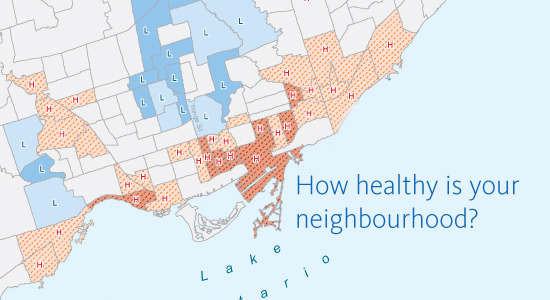What we’re doing: The Ontario Community Health Profiles Partnership makes high-quality, area-specific, health-related data available to everyone. We do this through our open-access website and free health maps as well as partnerships with health-care and social-service organizations.
Open-access website: The free data, maps and tables at www.OntarioHealthProfiles.ca can help you explore and compare different communities’:
Partnerships: Through regularly-updated, custom datasets, our expert spatial analysts help partners and new clients conduct research, set goals, measure progress and better understand and predict trends in their catchment areas. For example, our analysts can:
Our long-term partners and current clients include health-care planners, hospital administrators, health agencies and scientists.

Why we’re doing it: A strong health and social service system matches community resources to community needs. Our goal is to help communities, service providers and policy makers identify issues related to health equity and respond to gaps in services.
How we’re doing it: We have outstanding data partnerships and a staff of expert analysts. Most of our health data comes from population-based health surveys, de-identified patient records, and clinical and administrative databases housed at ICES (an independent, not-for-profit research institute funded by the Ontario Ministry of Health and Long-Term Care). Other data partners include Toronto Public Health, community health providers and independent researchers.
To learn more about OCHPP and becoming a client or partner, please contact Anne-Marie Tynan at TynanMA@smh.ca. We look forward to hearing from you!